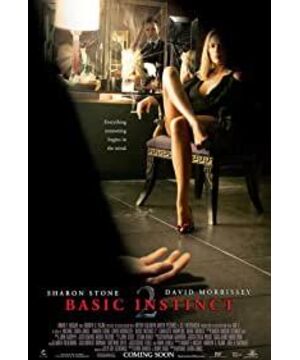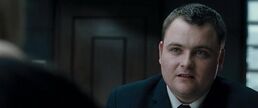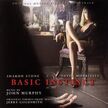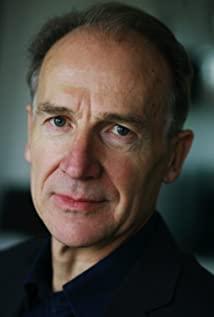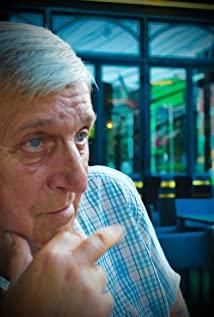"Instinct 2: Fatal Temptation" was still starring the sexy and charming Sharon Stone in 2006. She personally selected the director and co-actors to set the tone of the film. The filming process was full of ups and downs, and even due to several scuffles between the director and the leading male actor, he almost died a few times. But "Instinct"'s impressive box office in 1992 was a big temptation after all. The sequel's script completely continued the style of the first episode, except that the scene moved from sunny San Francisco to London, a cold gentleman, and the slightly impetuous San Francisco Police Department. Replaced by the cold-faced and merciless Scotland Yard. Although "Instinct 2", which cost 70 million US dollars, only recovered 5 million US dollars in the United States, it was listed as the most money-losing film in 2006. But it is a classic masterpiece with the background of psychoanalytic theory.
The beginning of the film begins with a flash of light that blurs and becomes clear. With the strong penetrating background sound, from slow to hurried, fast-moving cars blur the back street buildings, and cars. The men and women who are full of provocative, passionate, and greedy enjoyment of desires all portray a thrilling and exciting picture. The car flew out of the bridge, the background music stopped, and after drawing a beautiful arc, it rushed into the water heavily. A loud noise and splashing waves formed the thrilling opening of "Instinct 2". From the perspective of psychology, let's take a look at the thinking that this film brings us.
When I first met Catherine, I started a contest with the therapist. Mike was commissioned by the department to evaluate the suspect, Catherine, but Catherine asked her lawyer to evade. She had to talk to the therapist alone. Her fearlessness represented that she thought she could control the situation. Look at these conversations:
Catherine "The Department of Justice thought Know whether I will harm others. You are a psychologist sent by the Ministry of Justice. You will definitely call me dangerous. My psychologist said no, and the judge will rule
. " . . . . .
Glass "As far as I know, you are a writer. What do you write?"
Catherine "Murder, sex, violence" (with his back to the psychologist)
Glass "Have you ever written about yourself"
Catherine "I don't write an autobiography "
Glass "Really? Why"
Catherine "Perhaps I like to sit relaxed and listen to other people's complaints." "For example, you look like divorced" (starts to fight back against the therapist)
Glass "Why do you think I was divorced?"
Catherine" The ring mark has not disappeared. "
Glass" "You are very observant"
Catherine "Yes, but am I wrong?"
Glass "Will it be better if I guess wrong ?"
Catherine "Will it be better if I guess it right?" "
Tell me, what are you afraid of" (the therapist starts to defend and puts his hands on his chest)
Catherine is "boring"
Glass "that's why you like adventure"
Catherine "I do like adventure "
Glass" such as speeding, Take drugs and have sex at the same time, such as chatting with me without a lawyer present." (The therapist wants to control the situation)
Catherine "That’s your suggestion." )
Glass "for example, due to homicide trial, too risky. you may go to jail" (the therapist continues)
Catherine "not guilty would not have to"
Glass "is often innocent people to jail,"
Catherine "innocent money,
Asking Henry Rose to defend will not " Glass" "In that case, you are not guilty and not irritating" (this sentence is a good question)
Catherine "You also like to take risks" (change the subject, she wants to reverse the situation)
Glass "but I was not on trial for the murder case" (the therapist pulled the topic to himself and easily caused an attack)
Catherine "the time has not come" (lighting a cigarette, symbolizing an attack)
Glass "Sorry, no smoking here"
Catherine "Do you know what I like about you? You like to control the whole situation. Just like me."
Catherine aroused the control desire of the male therapist Glass, and Catherine did the same. How did she control the people around her--" "Sex", she is a bisexual and can maintain sexual relations with men and women at the same time. The therapist gave Catherine a diagnosis, saying that she had "risky syndrome" and that it hurts others as well as herself. This diagnosis may cause Catherine to go to jail. Glass also has to complete the thesis of "Thinking Syndrome", he persistently treats Catherine as a patient. Catherine is also studying, doing research for her novel. From a practical perspective, they both play an important role in the world that each other is interested in. They are each other's research and become a tool of exploration. From this point, it is destined that this treatment is inappropriate and impossible to succeed.
In fact, Glass had the opportunity to protect herself. When Catherine was released, she approached him and asked for treatment. It looks pitiful and needs help. Due to the setting of the therapist, (as an evaluation expert required by the Ministry of Justice, he cannot provide consultation and treatment for the patients evaluated at the same time). At this time, the therapist's refusal can protect himself well. But in the end he broke through the setting and agreed, accepting the patient, "Let's have another appointment"-the diagnosis of "Dangerous Syndrome" was also given to him.
Setting, the most important thing in the psychotherapy relationship, protects both the client and the therapist from being harmed. Breakthrough settings are like doctors and patients exposed to an environment full of germs without any protection and sterilization. The danger can be imagined. Some people who want to do psychological counseling take it for granted that they want to "chat" in places like tea rooms or cafes, but they also want to break through the settings. In fact, such places are not enough to establish a sense of psychological security, and the effect of counseling is greatly reduced and there are hidden dangers.
Back to the movie, it is the setting again. At the reception, Catherine “deliberately” ran into the therapist, and Mike set up (not meeting the patient outside of the treatment) to leave. There was such a dialogue.
Glass: You must have known that I was here, you just came.
Catherine: I know someone plays tennis with a psychologist.
Glass: Sex with them, sell them drugs, write scripts for them, but I don't do that.
Catherine: (pressing every step) How about we find a place to have a drink?
Glass: I said not to socialize with patients.
Catherine: (takes a step back), okay, how about we pure chat?
Glass: I'll talk about it tomorrow.
At this time, the therapist has boundaries and can also control the situation. But after the reception, Glass found his female colleague to replace him and had sex with his colleague. The whole person was fantasizing about Catherine having sex, and even imitating the sex posture described in Catherine's book.
Someone once said: Your desire is the direct source of me hypnotizing you! These things are the reason why the hero Glass is hypnotized and controlled.
The psychiatrist also had a "nightmare". There was a patient seven years ago. Glass felt his danger. He did not call the police. The patient killed his girlfriend. He was very guilty. This incident tortured him for many years. Very guilty, he told his ex-wife. (Break through the setting again, without boundaries) His ex-wife told a reporter (her lover) about the incident. He was worried that the reporter would disclose the incident to the world, and fear was born out of guilt. But unfortunately, people always repeat the same behavior. After receiving a call from his ex-wife, at the reporter's death scene, Glass found the lighter Catherine had used, and he threw it into the trash can. He clearly felt the danger of the patient as he did seven years ago, and chose to ignore it the same!
Catherine knew very well what his deadly black hole was, she had used it all, and these hypnosis were progressive and osmotic. Until she sat on the chair, spread her legs and said to him, "Do you want to have sex with me...what kind of posture do you like? ```" What we saw was a classic hypnotic scene! Finally, Catherine got up and prepared to leave and said: "The time is up... I want to end the treatment". Leave a helpless therapist! Generally speaking, patients will be more anxious after treatment, but here the situation is quite the opposite. The therapist is very anxious and keeps calling Catherine, asking Catherine to leave a message like crazy and follow Catherine••• (has lost one The minimum self-
awareness of a psychologist. The supervisor has sensed the danger and asked Glass to terminate the treatment: "She may be a murderer, but you describe her as a princess waiting for help."
Glass began to be confused, not knowing who to trust. Excessive involvement makes the therapist unable to withdraw, unable to analyze the problem from a neutral and objective perspective. When Glass found more evidence that Catherine was suspected of killing, Catherine took advantage of Glass's fear. Constantly controlling him, turning the authority around him into a tool to attack him, and in the end, including his supervisor, knew that he had sex with her, and was about to drown her in the water. Glass completely broke down, and she struck him with the authority he most recognized. At this time Supervisor began to get involved... (seems to be a foreshadowing left by the needs of filming, if possible, maybe the next sequel is Supervisor’s "Nightmare", haha)
Glass is "finished", We can clearly see that it is because of his own reasons, but is Catherine really "intentionally" trying to "tempt" and "punish" him to death? Maybe not! The answer is in her novel, she describes her mentality like this: "Does she trust this doctor? She once said that she needs her help, but does she really need it? She doesn't know this, if everything If things go well, she will need it, and if the opposite is the case, she will not need it. In that case, no matter what the outcome is, she can find a reason to protect herself.” It can be seen that everyone who comes for consultation or treatment hopes to solve it. Own problem.
When the picture is fixed on the blue sky, beautiful buildings, warm sunshine, and green grass, everything is calm and beautiful. The beautiful scenery may not calm our hearts. Catherine came to the psychiatric sanatorium to visit Grasse and take her The new book-"Catherine Woolf Psychoanalyst" was given to Glass, left a meaningful kiss, said the last sentence: "Baby, come back quickly, I miss you", then turned and left, Looking at Catherine's back, Glass opened the book and saw the title page read: "To Glass: I can't do it without you, love you Catherine". Watching Catherine's fluttering coat and skirt when the wind blows, and watching the distant back, Mike's mouth shrank.
Freud summarized all psychoanalysis into two basic propositions, namely subconsciousness and instinct or desire. If subconsciousness theory is the core of psychoanalysis, then instinct theory is the core of subconsciousness theory.
In Freud's early theory, instinct was divided into two types: self instinct and sexual instinct. Freud believed that sexual instinct is a kind of original desire, a kind of power, which he called li-bido, which is expressed as a sexual impulse, seeking pleasure and satisfaction. Freud put forward the concept of "death instinct" in his later theory. He combined the self-instinct and sexual instinct that he put forward before, and called it the "instinct of life". In this way, two poles are formed. The instinct of life represents the power of creation and love, and the instinct of death represents the power of destruction and hatred.
The title of the film actually directly points out such a theme and meaning.
The ups and downs of the plot, the clever use of symbolism, the confrontation and contention in the heart,
the good combination of background music, and the perfect control of psychology, make "Instinct 2" a rare film with a theoretical background of psychoanalysis. Seriously Watching and thinking, it seems that we can see the true face of instinct, but in my opinion, it may be more appropriate to call it "instinct contest."
It can be taken as a warning: as a consultant, we have to know our limitations and know where our hearts are. We are also ordinary people, or patients. Remember that there are two people sitting in a consultation room, one is a little more anxious, and the other is more anxious, then the more anxious one is the patient.
View more about Basic Instinct 2 reviews


